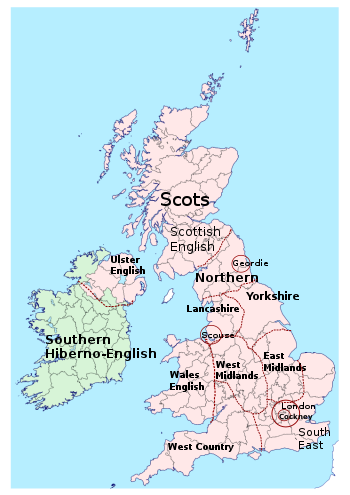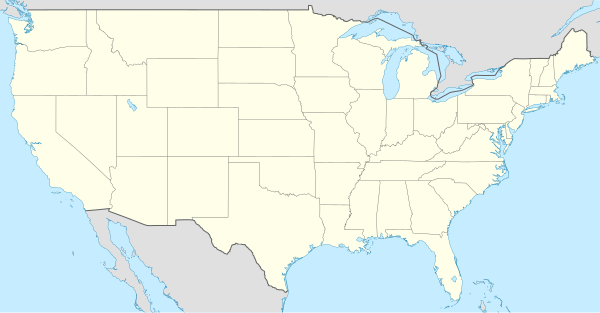Dialects are linguistic varieties that may differ in pronunciation, vocabulary, spelling, and other aspects of grammar. For the classification of varieties of English only in of pronunciation, see regional accents of English.
Overview
Dialects can be defined as "sub-forms of languages which are, in general, mutually comprehensible." English speakers from different countries and regions use a variety of different accents (systems of pronunciation) as well as various localized words and grammatical constructions. Many different dialects can be identified based on these factors. Dialects can be classified at broader or narrower levels: within a broad national or regional dialect, various more localised sub-dialects can be identified, and so on. The combination of differences in pronunciation and use of local words may make some English dialects almost unintelligible to speakers from other regions without any prior exposure.
The major native dialects of English are often divided by linguists into three general categories: the British Isles dialects, those of North America, and those of Australasia. Dialects can be associated not only with place but also with particular social groups. Within a given English-speaking country, there is a form of the language considered to be Standard English: the Standard Englishes of different countries differ and can themselves be considered dialects. Standard English is often associated with the more educated layers of society as well as more formal registers.
British and American English are the reference norms for English as spoken, written, and taught in the rest of the world, excluding countries in which English is spoken natively such as Australia, Canada, Ireland, and New Zealand. In many former British Empire countries in which English is not spoken natively, British English forms are closely followed, alongside numerous American English usages that have become widespread throughout the English-speaking world. Conversely, a number of countries with historical ties to the United States tend to follow American English conventions. Many of these countries, while retaining strong British English or American English influences, have developed their own unique dialects, which include Indian English and Philippine English.
Chief among other native English dialects are Canadian English and Australian English, which rank third and fourth in the number of native speakers. For the most part, Canadian English, while featuring numerous British forms, alongside indigenous Canadianisms, shares vocabulary, phonology and syntax with American English, which leads many to recognise North American English as an organic grouping of dialects. Australian English, likewise, shares many American and British English usages, alongside plentiful features unique to Australia and retains a significantly higher degree of distinctiveness from both larger varieties than does Canadian English. South African English, New Zealand English and Irish English are also distinctive and rank fifth, sixth, and seventh in the number of native speakers.
Europe

Great Britain
England
- Standard English (Not to be confused with the accent Received Pronunciation)
- Northern
- East Midlands
- West Midlands
- Black Country
- Brummie (Birmingham)
- Potteries (north Staffordshire)
- Coventry
- East Anglian
- Southern
- Cockney (working-class London and surrounding areas)
- Estuary
- Received Pronunciation (middle-class London, Home Counties and Hampshire)
- Multicultural London (London)
- Sussex
- West Country
- Cornwall
- Bristolian
- Dorset
- Janner (Plymouth)
Scotland
- Scottish English comprising varieties based on the Standard English of England.
Wales
Non-geographic based English
British dependencies and territories
- Channel Islands: Channel Island English
- Isle of Man: Manx English
- Gibraltar: Gibraltarian English
Ireland
- Hiberno-English (Irish English)
- Extinct
- Yola language (also known as Forth and Bargy dialect), thought to have been a descendant of Middle English, spoken in County Wexford
- Fingallian, another presumed descendant of Middle English, spoken in Fingal
Continental Europe
Eastern Europe
Mediterranean
North America
United States
 ENE
WNE
NYC
PHILA.
INLAND NORTH
WPA
NORTH CENTRAL
WEST
MIDLAND
SOUTH
Texas
California
Appalachia
Boston
Pacific
ENE
WNE
NYC
PHILA.
INLAND NORTH
WPA
NORTH CENTRAL
WEST
MIDLAND
SOUTH
Texas
California
Appalachia
Boston
Pacific Northwest Chesapeake &
Outer Banks Maine New
Orleans Baltimore Interactive map of American English
- Cultural and ethnic American English
- African American English
- Cajun Vernacular English
- General American: the "standard" or "mainstream" spectrum of American English
- Latino (Hispanic) Vernacular Englishes
- Chicano English (Mexican-American English)
- Miami English
- New York Latino English
- Pennsylvania Dutch English
- Yeshiva English
- American Indian English
- Regional and local American English
- Northern American English
- Inland Northern English: Chicago, Cleveland, Detroit, Milwaukee, Western New York, the Lower Peninsula of Michigan, and most of the U.S. Great Lakes region
- New England English
- Eastern New England English (including Boston and Maine English)
- Western New England English: Connecticut, Hudson Valley, western Massachusetts, and Vermont
- North-Central (Upper Midwestern) English: northern Wisconsin, northern Minnesota, North Dakota, Montana
- Metropolitan New York English
- Southeast Super-Regional English
- Midland American English
- North Midland English: Iowa City, Omaha, Lincoln, Columbia, Springfield, Muncie, Columbus, etc.
- South Midland English: Oklahoma City, Tulsa, Topeka, Wichita, Kansas City, St. Louis (in transition), Decatur, Indianapolis, Cincinnati, Dayton, etc.
- "Hoi Toider" English: traditional dialect of the Chesapeake Bay, Tangier, Ocracoke, the Outer Banks, Virginia Barrier Islands, etc.
- New Orleans English
- Philadelphia English
- Southern American English
- Southern Appalachian English: Linden, Birmingham, Chattanooga, Knoxville, Asheville, and Greenville
- Texan English: Lubbock, Odessa, and Dallas
- Tennessean English: Nashville, Murfreesboro, Memphis
- Midland American English
- Western American English
- Western Pennsylvania (Pittsburgh) English
- Northern American English
- Extinct or near-extinct American English
- American English-based hybrid languages (creoles or pidgins)
- Afro-Seminole Creole
- Gullah language/Sea Island Creole English, South-East US related to Bahamian creole
- Hawaiian Pidgin
Canada
 STANDARD CANADIAN
Pacific
STANDARD CANADIAN
Pacific Northwest Aboriginal Canadian Quebec Ottawa MTE ATLANTIC CANADIAN Lunenburg Newfoundland Interactive map of Canadian English
- Aboriginal English in Canada
- Atlantic Canadian English
- Greater Toronto English
- Ottawa Valley English
- Quebec English
- Standard Canadian English
Caribbean, Central, and South America
Caribbean
The Bahamas
Barbados
Belize
Bermuda
Cayman Islands
Colombia
Costa Rica
Dominican Republic
Falkland Islands
Guyana
Honduras
Jamaica
Nicaragua
Panama
Puerto Rico
Saba
Saint Vincent and the Grenadines
- Vincentian English
Trinidad and Tobago
Turks and Caicos Islands
Virgin Islands
Asia
Bangladesh
- Bangladeshi English (Benglish or Banglish)
Brunei
Myanmar (Burma)
Hong Kong
China and Taiwan
- Chinese Pidgin English (Extinct)
- Chinglish
India
Indian English:
- Standard Indian English
- Indian English: the "standard" English used by government administration, it derives from the British Indian Empire.
- Butler English: (also Bearer English or Kitchen English), once an occupational dialect, now a social dialect.
- Hinglish: a growing macaronic hybrid use of English and Indian languages.
- Regional and local Indian English
- East Region: Odia English, Bhojpuriya English, Assamese English, Bengali English, North-East Indian English etc.
- West Region: Gujarati English, Maharashtrian English etc.
- North Region: Hindustani English, Delhi/Punjabi English, Rajasthani English etc.
- South Region: Telugu English, Kannada English, Kanglish, Tenglish, Tanglish, Tamil English, Malayali English etc.
Japan
South Korea
Malaysia
Middle East
Nepal
Pakistan
Philippines
Singapore
Sri Lanka
Africa
Cameroon
The Gambia
Ghana
Kenya
Liberia
Malawi
Namibia
Nigeria
Sierra Leone
South Africa
- South African English: Black South African English, White South African English, Indian South African English etc.
South Atlantic
- South Atlantic English spoken on Tristan da Cunha and Saint Helena
Uganda
Zambia
Zimbabwe
Oceania
Australia
- Australian English
- General Australian: Broad Australian, Cultivated Australian, Mediterranean accent etc.
Fiji
New Zealand
- New Zealand English: Māori English, Pasifika English, Southland accent, West Coast Irish Catholic accent, Taranaki accent etc.
Palau
South Atlantic
World Global English
These dialects are used in everyday conversation almost all over the world, and are used as lingua francas and to determine grammar rules and guidelines.
- Standard English
- Learning English
- International English
- English as a lingua franca
- Simplified Technical English
Antarctica
See also
- American English regional vocabulary
- English-based creole languages
- History of the English language
- Linguistic purism in English
- List of English-based pidgins
- Macaronic language
- Regional accents of English
- Schneider's dynamic model
- Survey of English Dialects
- World Englishes
References
- Wakelin, Martyn Francis (2008). Discovering English Dialects. Oxford: Shire Publications. p. 4. ISBN 978-0-7478-0176-4.
- Crystal, David. The Cambridge Encyclopedia of the English Language, Cambridge University Press, 2003
- Filppula, Markku; Klemola, Juhani; Sharma, Devyani, eds. (2013-12-16). "The Oxford Handbook of World Englishes". Oxford Handbooks Online. doi:10.1093/oxfordhb/9780199777716.001.0001. ISBN 978-0-19-977771-6.
- The Cambridge History of the English Language. Cambridge University Press. 1999-01-28. doi:10.1017/chol9780521264778.011. ISBN 978-1-139-05365-5.
- Trudgill and Hannah, 2002
- ^ Hickey, Raymond (2005). Dublin English: Evolution and Change. John Benjamins Publishing. pp. 196–198. ISBN 90-272-4895-8.
- Hickey, Raymond (2002). A Source Book for Irish English (PDF). Amsterdam: John Benjamins Publishing. pp. 28–29. ISBN 90-272-3753-0.
ISBN 1-58811-209-8 (US)
- Daniel Schreier, Peter Trudgill. The Lesser-Known Varieties of English: An Introduction. Cambridge University Press, Mar 4, 2010 pg. 10
Further reading
- Hickey, Raymond (2014). A Dictionary of Varieties of English. Malden, MA: Wiley-Blackwell. ISBN 978-0-470-65641-9.
- Nunan, David (2012), What Is This Thing Called Language?, Palgrave Macmillan, ISBN 978-1-137-28499-0.
- Okrent, A. (2010), In the Land of Invented Languages: A Celebration of Linguistic Creativity, Madness, and Genius, Spiegel & Grau Trade Paperbacks, ISBN 978-0-8129-8089-9.
- Hickey, Raymond, ed. (2010). Varieties of English in Writing. The Written Word as Linguistic Evidence. Amsterdam: John Benjamins. ISBN 978-90-272-4901-2.
- Hickey, Raymond, ed. (2004). Legacies of Colonial English. Studies in Transported Dialects. Cambridge: Cambridge University Press. ISBN 978-0-521-17507-4.
- Fischer, Steven Roger (2004), History of Language, Reaktion Books, ISBN 978-1-86189-594-3.
- Crystal, David (2003). The Cambridge Encyclopedia of the English Language (Second ed.). Cambridge, UK: Cambridge University Press. p. 109. ISBN 978-0-521-53033-0.
- Bolton, K. (2002), Hong Kong English: Autonomy and Creativity, Asian Englishes Today, Hong Kong University Press, ISBN 978-962-209-553-3, retrieved 2015-10-22.
- "English Language § Varieties of English", Encyclopædia Britannica, vol. 6 (Earth–Everglades) (Fifth ed.), 1974, pp. 883–886.
External links
- Sounds Familiar? Listen to examples of regional accents and dialects from across the UK on the British Library's 'Sounds Familiar?' website
- A national map of the regional dialects of American English
- IDEA Archived 2006-09-01 at the Wayback Machine – International Dialects of English Archive
- English Dialects – English Dialects around the world
- Dialect poetry from the English regions
- American Languages: Our Nation's Many Voices - An online audio resource presenting interviews with speakers of German-American and American English dialects from across the United States
- electronic World Atlas of Varieties of English (eWAVE)
| Dialects and accents of Modern English by continent | |||||||||||||||||||
|---|---|---|---|---|---|---|---|---|---|---|---|---|---|---|---|---|---|---|---|
| Europe |
| ||||||||||||||||||
| Americas |
| ||||||||||||||||||
| Oceania |
| ||||||||||||||||||
| Africa | |||||||||||||||||||
| Asia |
| ||||||||||||||||||
| Related |
| ||||||||||||||||||
| Description of the English language | |
|---|---|
| Varieties of languages | |
|---|---|
|